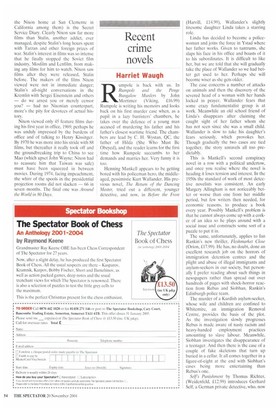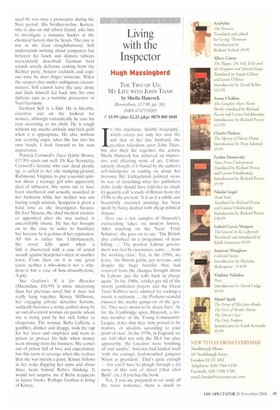Recent crime novels
Harriet Waugh
the Nixon home at San Clemente in California among them) is the Secret Service Diary. Clearly Nixon saw far more films than Stalin, another addict, ever managed, despite Stalin's long hours spent with Tarzan and other foreign prizes of war. Stalin's interest in films was so intense that he finally stopped the Soviet film industry, Mosfilm and Lenfilm, from making any films for him to watch. Nixon saw films after they were released, Stalin before. The makers of the films Nixon viewed were not in immediate danger; Stalin's all-night conversations in the Kremlin with Sergei Eisenstein and others — do we arrest you or merely censor you? — had no Nixonian counterpart, more's the pity for devotees of actual history.
Nixon viewed only 45 feature films during his first year in office, 1969; perhaps he was unduly impressed by the burdens of office and of talking to Henry Kissinger. By 1970 he was more into his stride with 88 films, but thereafter it really took off and the groundbreaking trip to China to see Mao (which upset John Wayne; Nixon had to reassure him that Taiwan was safe) must have been squeezed in between movies. During 1974, facing impeachment, the whirr of the spools in the presidential projection rooms did not slacken — 66 in seven months, The final one was Around the World in 80 Days..
Rumpole is back with us. In Ruinpole and the Penge Bungalow Murders by John Mortimer (Viking, £16.99) Rumpole is writing his memoirs and looks back on his first murder case when, as a pupil in a lazy barristers' chambers, he takes over the defence of a young man accused of murdering his father and his father's closest wartime friend. The chambers are lead by C. H. Wystan, QC, the father of Hilda (She Who Must Be Obeyed), and the reader learns for the first time how Rumpole succumbs to her demands and marries her. Very funny it is too.
Henning Mankell appears to be getting bored with his policeman hero, the middleaged, pessimistic Kurt Wallander. His previous novel, The Return of the Dancing Master, tried out a different, younger detective, and now, in Before the Frost (Harvill, £14.99), Wallander's slightly tiresome daughter Linda takes a starring role.
Linda has decided to become a policewoman and joins the force in Ystad where her father works. Given to tantrums, she slaps his face in his office and boasts of it to his subordinates. It is difficult to like her, but we are told that she will gradually take the place of Wallander so we had better get used to her. Perhaps she will become wiser as she gets older.
The case concerns a number of attacks on animals and then the discovery of the severed head of a woman with her hands locked in prayer. Wallander fears that some crazy fundamentalist group is at work. Meanwhile an old school friend of Linda's disappears after claiming she caught sight of her father whom she has not seen since she was a small child. Wallander is slow to take his daughter's fears seriously, which provokes her. Though gradually the two cases are tied together, the story unravels all too predictably.
This is Mankell's second conspiracy novel in a row with a political undertow, and once you realise where the novel is heading it loses tension and interest. In the 1950s the standard of work of most detective novelists was consistent. An early Margery Allingham is not noticeably better or worse than one from her middle period, but few writers then needed, for economic reasons, to produce a book every year. Possibly Mankell's problem is that he cannot always come up with a corker of an idea so he plays around with a social issue and constructs some sort of a puzzle to put it in.
The same, unfortunately, applies to Ian Rankin's new thriller, Fleshmarket Close (Orion, £17.99). He has, no doubt, done an excellent research job on the horrors of immigration detention centres and the plight and abuse of illegal immigrants and asylum-seekers in our society, but personally I prefer reading about such things in newspapers rather than spread out over hundreds of pages with shock-horror reaction from Rebus and Siobhan, Rankin's Edinburgh police team.
The murder of a Kurdish asylum-seeker, whose wife and children are confined to Whitemire, an immigration Removal Centre, provides the basis of the plot. As the investigation slowly progresses Rebus is made aware of nasty racism and heavy-handed employment practices amounting to slave labour. Meanwhile, Siobhan investigates the disappearance of a teenager. And then there is the case of a couple of fake skeletons that turn up buried in a cellar. It all comes together in a figure-of-eight at the end with Siobhan's cases being more entertaining than Rebus's one.
Sells Punishment by Thomas Richter, (Weidenfeld, £12.99) introduces Gerhard Self, a German private detective, who, now aged 68, was once a prosecutor during the Nazi period. His brother-in-law, Korten, who is also an old school friend, asks him to investigate a nuisance hacker at the chemical factory that he heads. The case is not in the least straightforward; Self understands nothing about computers but between his lunch and dinners (always meticulously described; German food sounds utterly delicious coming from the Richter pen), Aviator cocktails and copious wine he does finger someone. When the suspect dies under ambiguous circumstances. Self cannot leave the case alone and finds himself led back into his own dubious past as a wartime prosecutor in Nazi Germany.
Gerhard Self is a find. He is likeable, eccentric and on the lookout for women, although romantically he cuts his coat according to his cloth. He is tough without any macho attitude and feels guilt when it is appropriate. He also, without any seeming angst, takes the law into his own hands. I look forward to his next appearance.
Patricia Cornwell's Trace (Little Brown, £17.99) starts out well. Dr Kay Scarpetta, Cornwell's heroine who cuts dead people up, is called to her old stamping-ground, Richmond, Virginia, to give a second opinion about a teenage girl who apparently died of influenza. She turns out to have been smothered and sexually assaulted in her bedroom while her mother was out buying cough mixture. Scarpetta is given a hard time as she investigates because Dr Joel Marcus, the chief medical examiner appointed after she was sacked, is uncertifiably insane. He has her brought on to the case in order to humiliate her because he is jealous of her reputation. All this is rather fun. Unfortunately, the novel falls apart when a link is discovered with a case of sexual assault against Scarpetta's niece in another town. From then on it is one great yawn: neither a who-done-it nor a whydone-it but a case of how-absurdly-done. A pity.
Sue Grafton's R is for Ricochet (Macmillan, £16.99) is more interesting than her previous novel but it does not really hang together. Kinse■,, Millhorne, her engaging private detective heroine, suddenly becomes a wimp, pulled along by an out-of-control woman on parole whom she is being paid by her rich father to chaperone. The woman, Reba Lafferty, a gambler, drinker and druggy, took the rap for her lover and employer and went to prison to protect his hide when money went missing from his business. She comes out of prison full of love and expectation, but this turns to revenge when she realises that she was merely a patsy. Kinsey follows in her wake flapping her arms and about three beats behind Reba's thinking. It would not surprise me if Reba reappears in future books. Perhaps Grafton is tiring of Kinsey.



























































































 Previous page
Previous page